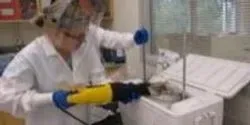News

University of Idaho researchers will soon have a new tool for understanding the world at the molecular level, thanks to a grant from the MJ Murdock Charitable Trust and a major gift from a private donor.

Ocean researchers like to say we know less about the Earth’s seas than the moon. With less than 5 percent of the world’s oceans explored, big discoveries await. To find them, University of Rhode Island students are learning to build the next generation of autonomous underwater vehicles, or AUVs, used to map seafloors, study ocean movement, locate sunken objects, research sea life and more.

Trapping carbon dioxide (CO2) emissions from power plants and various industries could play a significant role in reducing greenhouse gas emissions in the future. But current materials that can collect CO2—from smokestacks, for example—have low capacities or require very high temperatures to work.

One of Florida’s leading public research universities and two of the world’s premier research institutions will create one-of-a-kind education programs that will attract the best and brightest students to Palm Beach County, and transform Florida Atlantic University’s John D. MacArthur Campus in Jupiter into a hub of scientific inquiry, innovation, and economic development.

New research from the University of Virginia School of Medicine has shed light on how chronic stress and obesity may contribute to type 2 diabetes. The findings point the finger at an unexpected biological perpetrator – the breakdown of fat.
















